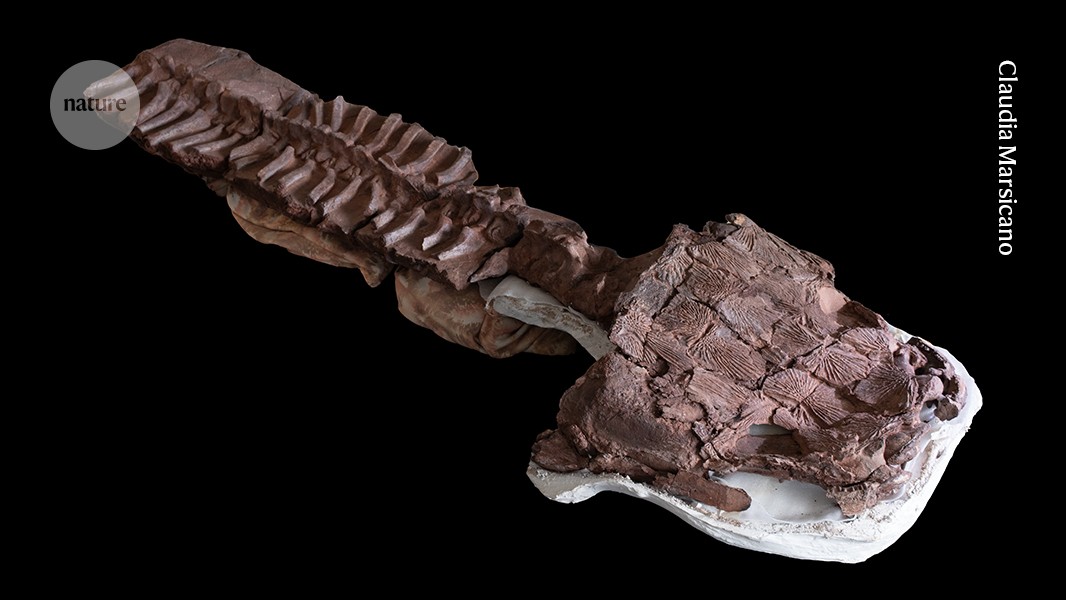Discovery of Unexpected Tetrapod Fossils Far from the Equator Challenges Assumptions about Fossil Record Completeness
Conceitos Básicos
The discovery of previously undescribed early tetrapod fossils in an unexpected geographical location challenges the assumption that the fossil record is complete, revealing the limitations of current paleontological knowledge.
Resumo
The article discusses how the fossil record is often considered incomplete, but an underappreciated aspect of this incompleteness is the geographical coverage of the record. The authors report the discovery of fossil evidence of a previously undescribed early four-limbed vertebrate (tetrapod) in a location and time period that would not have been expected by paleontologists.
This finding challenges the assumptions about the completeness of the fossil record, as it reveals the presence of tetrapods in regions and time periods where their existence was previously unknown. The discovery highlights the limitations of current paleontological knowledge and the need to continue exploring and expanding the geographical coverage of the fossil record to gain a more comprehensive understanding of the evolution of early tetrapods and other vertebrates.
Traduzir Texto Original
Para Outro Idioma
Gerar Mapa Mental
do conteúdo original
Visitar Fonte
www.nature.com
Fossils found far from the Equator point to globetrotting tetrapods
Estatísticas
The fossil evidence of the previously undescribed early tetrapod was found in a location and time period that no paleontologist would have expected.
Citações
"The truism that the fossil record is incomplete is as old as palaeontology itself."
"Writing in Nature, Marsicano et al.1 report fossil evidence of a previously undescribed early four-limbed vertebrate (tetrapod) from a place and time that no palaeontologist would have expected."
Perguntas Mais Profundas
What implications does this unexpected fossil discovery have for our understanding of tetrapod evolution and distribution?
The unexpected fossil discovery of an early tetrapod in a surprising location challenges our previous assumptions about the evolution and distribution of tetrapods. This finding suggests that tetrapods had a wider geographical range and were more mobile than previously thought. It implies that early tetrapods were capable of long-distance dispersal and could inhabit regions far from the Equator. This discovery prompts a reevaluation of existing models of tetrapod evolution, highlighting the need to consider more diverse and unconventional habitats in which these organisms could have thrived.
How might this finding challenge or refine existing theories about the geographical and temporal patterns of early tetrapod dispersal and diversification?
The discovery of tetrapod fossils in unexpected locations challenges existing theories about the geographical and temporal patterns of early tetrapod dispersal and diversification. It suggests that early tetrapods were more cosmopolitan in their distribution and had the ability to colonize diverse environments. This finding may refine our understanding of the timing and routes of tetrapod dispersal, indicating that these organisms were capable of traversing long distances and adapting to different ecological conditions. It challenges the notion of restricted dispersal and highlights the need to consider a broader range of factors that influenced the evolutionary history of tetrapods.
What other unexpected fossil discoveries in unusual locations might be waiting to be uncovered, and how could they further transform our knowledge of the history of life on Earth?
There are likely many other unexpected fossil discoveries waiting to be uncovered in unusual locations that could further transform our knowledge of the history of life on Earth. For example, finding marine fossils in high-altitude regions or tropical species in polar environments could provide valuable insights into past climates, biogeography, and evolutionary processes. Uncovering fossils of ancient organisms in unexpected locations could challenge existing paradigms, reveal new patterns of dispersal and diversification, and shed light on the interconnectedness of different ecosystems throughout Earth's history. These discoveries have the potential to revolutionize our understanding of the evolutionary dynamics that have shaped life on our planet.

